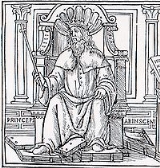
John Blund
Encyclopedia
John Blund was an English scholastic philosopher, known for his work on the nature of the soul, the Tractatus de anima, one of the first works of western philosophy to make use of the recently translated De Anima by Aristotle
and especially the Arab philosopher Avicenna's work on the soul, also called De Anima. He taught at Oxford University along with Edmund of Abingdon. David Knowles said that he was "noteworthy for his knowledge of Avicenna
and his rejection of the hylomorphism of Avicebron and the plurality of forms.", although the problem of the plurality of forms as understood by later scholastics was not formulated explicitly in Blund's time. Maurice Powicke calls him the "first English Aristotelian."
He was a royal clerk by 1227 and studied at Oxford and Paris
, and was at the University of Paris
when it was dispersed
in 1229. He was a canon
of Chichester
before 1232. He was archbishop of Canterbury
during a brief reign, having been elected on 26 August 1232. He was supported by Peter des Roches
, but did not receive papal approval and the election was quashed because of alleged pluralism
on 1 June 1233. Probably it was the support of des Roches that doomed his election to Canterbury, and the pluralism charge was cover for the real reason. He was appointed chancellor of the see of York before 3 November 1234, and died in 1248.
Aristotle
Aristotle was a Greek philosopher and polymath, a student of Plato and teacher of Alexander the Great. His writings cover many subjects, including physics, metaphysics, poetry, theater, music, logic, rhetoric, linguistics, politics, government, ethics, biology, and zoology...
and especially the Arab philosopher Avicenna's work on the soul, also called De Anima. He taught at Oxford University along with Edmund of Abingdon. David Knowles said that he was "noteworthy for his knowledge of Avicenna
Avicenna
Abū ʿAlī al-Ḥusayn ibn ʿAbd Allāh ibn Sīnā , commonly known as Ibn Sīnā or by his Latinized name Avicenna, was a Persian polymath, who wrote almost 450 treatises on a wide range of subjects, of which around 240 have survived...
and his rejection of the hylomorphism of Avicebron and the plurality of forms.", although the problem of the plurality of forms as understood by later scholastics was not formulated explicitly in Blund's time. Maurice Powicke calls him the "first English Aristotelian."
He was a royal clerk by 1227 and studied at Oxford and Paris
Paris
Paris is the capital and largest city in France, situated on the river Seine, in northern France, at the heart of the Île-de-France region...
, and was at the University of Paris
University of Paris
The University of Paris was a university located in Paris, France and one of the earliest to be established in Europe. It was founded in the mid 12th century, and officially recognized as a university probably between 1160 and 1250...
when it was dispersed
University of Paris strike of 1229
In 1229, a student riot at the University of Paris resulted in the deaths of a number of students, and the ensuing "dispersion" or student strike in protest lasted more than two years and led to a number of reforms of the medieval university...
in 1229. He was a canon
Canon (priest)
A canon is a priest or minister who is a member of certain bodies of the Christian clergy subject to an ecclesiastical rule ....
of Chichester
Chichester
Chichester is a cathedral city in West Sussex, within the historic County of Sussex, South-East England. It has a long history as a settlement; its Roman past and its subsequent importance in Anglo-Saxon times are only its beginnings...
before 1232. He was archbishop of Canterbury
Archbishop of Canterbury
The Archbishop of Canterbury is the senior bishop and principal leader of the Church of England, the symbolic head of the worldwide Anglican Communion, and the diocesan bishop of the Diocese of Canterbury. In his role as head of the Anglican Communion, the archbishop leads the third largest group...
during a brief reign, having been elected on 26 August 1232. He was supported by Peter des Roches
Peter des Roches
Peter des Roches was bishop of Winchester in the reigns of King John of England and his son Henry III. Roches was not an Englishman, but a Poitevin.-Life:...
, but did not receive papal approval and the election was quashed because of alleged pluralism
Religious pluralism
Religious pluralism is a loosely defined expression concerning acceptance of various religions, and is used in a number of related ways:* As the name of the worldview according to which one's religion is not the sole and exclusive source of truth, and thus that at least some truths and true values...
on 1 June 1233. Probably it was the support of des Roches that doomed his election to Canterbury, and the pluralism charge was cover for the real reason. He was appointed chancellor of the see of York before 3 November 1234, and died in 1248.
Further reading
- Josiah Cox Russell, "Master Henry of Avranches as an International Poet," SpeculumSpeculum (journal)Speculum: A Journal of Medieval Studies is a quarterly academic journal published by the Medieval Academy of America. It was established in 1926. The journal's primary focus is on the time period from 500-1500 in Western Europe, but also on related subjects such as Byzantine, Hebrew, Arabic, and...
, Vol. 3, No. 1 (Jan., 1928), pp. 34–63.

